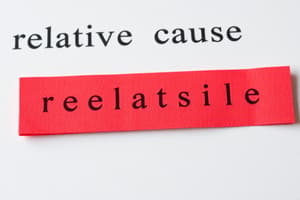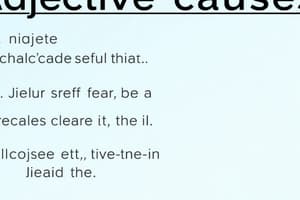Podcast
Questions and Answers
Which of the following sentences correctly uses a relative pronoun to introduce a non-restrictive clause?
Which of the following sentences correctly uses a relative pronoun to introduce a non-restrictive clause?
- The car that is parked outside is mine.
- My sister, who is a teacher, loves her job. (correct)
- The book which I found yesterday was very interesting.
- The house whose roof is red belongs to my uncle.
In the sentence, 'The students _ volunteered for the community project received extra credit,' which relative pronoun correctly completes the sentence?
In the sentence, 'The students _ volunteered for the community project received extra credit,' which relative pronoun correctly completes the sentence?
- which
- what
- that (correct)
- whose
Identify the sentence that demonstrates the correct usage of the interrogative pronoun 'whom'.
Identify the sentence that demonstrates the correct usage of the interrogative pronoun 'whom'.
- Who is going to the store?
- Whom did you see at the concert? (correct)
- Who did you give the book to?
- Whom do you think will win the election?
Which interrogative pronoun is most suitable for asking about the owner of a lost umbrella?
Which interrogative pronoun is most suitable for asking about the owner of a lost umbrella?
In which sentence does the demonstrative pronoun function as an adjective?
In which sentence does the demonstrative pronoun function as an adjective?
Choose the sentence that correctly uses a demonstrative pronoun to indicate something at a distance.
Choose the sentence that correctly uses a demonstrative pronoun to indicate something at a distance.
Which of the following sentences demonstrates correct pronoun-antecedent agreement with an indefinite pronoun?
Which of the following sentences demonstrates correct pronoun-antecedent agreement with an indefinite pronoun?
Identify the sentence where the indefinite pronoun is used in a plural context.
Identify the sentence where the indefinite pronoun is used in a plural context.
In which of the following sentences is the compound personal pronoun used reflexively?
In which of the following sentences is the compound personal pronoun used reflexively?
Choose the sentence in which the compound personal pronoun is used intensively.
Choose the sentence in which the compound personal pronoun is used intensively.
Which sentence correctly employs a relative clause with the relative pronoun 'whose'?
Which sentence correctly employs a relative clause with the relative pronoun 'whose'?
Select the sentence that contains an interrogative pronoun used as the subject of the verb.
Select the sentence that contains an interrogative pronoun used as the subject of the verb.
Which of the following sentences correctly uses a demonstrative pronoun to refer to multiple items that are nearby?
Which of the following sentences correctly uses a demonstrative pronoun to refer to multiple items that are nearby?
Choose the sentence that uses an indefinite pronoun in a way that requires a singular verb.
Choose the sentence that uses an indefinite pronoun in a way that requires a singular verb.
Identify the sentence where the reflexive pronoun is essential to the meaning and indicates the subject is both performing and receiving the action.
Identify the sentence where the reflexive pronoun is essential to the meaning and indicates the subject is both performing and receiving the action.
In the sentence, 'The movie _____ we watched last night was amazing,' which relative pronoun should be used to fill in the blank?
In the sentence, 'The movie _____ we watched last night was amazing,' which relative pronoun should be used to fill in the blank?
Choose the sentence using the correct interrogative pronoun to ask about a person.
Choose the sentence using the correct interrogative pronoun to ask about a person.
Select the sentence that correctly uses the demonstrative pronoun to identify a single object that is far away.
Select the sentence that correctly uses the demonstrative pronoun to identify a single object that is far away.
Identify the sentence in which the indefinite pronoun is used to denote a singular entity.
Identify the sentence in which the indefinite pronoun is used to denote a singular entity.
In which sentence does the compound personal pronoun function as an intensive pronoun, adding emphasis but not essential to the sentence's structure?
In which sentence does the compound personal pronoun function as an intensive pronoun, adding emphasis but not essential to the sentence's structure?
Which sentence demonstrates a restrictive relative clause?
Which sentence demonstrates a restrictive relative clause?
Select the most appropriate interrogative pronoun to complete the question: '_____ gave you that information?'
Select the most appropriate interrogative pronoun to complete the question: '_____ gave you that information?'
Choose the sentence that correctly uses a demonstrative pronoun to refer to multiple further objects.
Choose the sentence that correctly uses a demonstrative pronoun to refer to multiple further objects.
Which of the following sentences correctly uses an indefinite pronoun in a plural sense?
Which of the following sentences correctly uses an indefinite pronoun in a plural sense?
In which sentence is the compound personal pronoun used reflexively, indicating that someone performed an action that affected themselves?
In which sentence is the compound personal pronoun used reflexively, indicating that someone performed an action that affected themselves?
Flashcards
Pronouns
Pronouns
Words that replace nouns or noun phrases to avoid repetition.
Relative Pronouns
Relative Pronouns
Introduce relative clauses, adding information about a noun.
Common Relative Pronouns
Common Relative Pronouns
who, whom, which, that, whose
Restrictive Clause
Restrictive Clause
Signup and view all the flashcards
Non-Restrictive Clause
Non-Restrictive Clause
Signup and view all the flashcards
Interrogative Pronouns
Interrogative Pronouns
Signup and view all the flashcards
Main Interrogative Pronouns
Main Interrogative Pronouns
Signup and view all the flashcards
"Who"
"Who"
Signup and view all the flashcards
"Whom"
"Whom"
Signup and view all the flashcards
Demonstrative Pronouns
Demonstrative Pronouns
Signup and view all the flashcards
Main Demonstrative Pronouns
Main Demonstrative Pronouns
Signup and view all the flashcards
"This" and "These"
"This" and "These"
Signup and view all the flashcards
"That" and "Those"
"That" and "Those"
Signup and view all the flashcards
Indefinite Pronouns
Indefinite Pronouns
Signup and view all the flashcards
Common Indefinite Pronouns
Common Indefinite Pronouns
Signup and view all the flashcards
Compound Personal Pronouns
Compound Personal Pronouns
Signup and view all the flashcards
Reflexive Pronouns
Reflexive Pronouns
Signup and view all the flashcards
Intensive Pronouns
Intensive Pronouns
Signup and view all the flashcards
Common Reflexive Pronouns
Common Reflexive Pronouns
Signup and view all the flashcards
Common Intensive Pronouns
Common Intensive Pronouns
Signup and view all the flashcards
Study Notes
- A pronoun replaces a noun or noun phrase.
- Pronouns prevent repetition and improve sentence conciseness.
- Pronouns must agree in number and gender with their antecedent (the noun they replace).
Relative Pronouns
- Relative pronouns introduce relative clauses, providing additional noun information.
- Common relative pronouns include who, whom, which, that, and whose.
- "Who" and "whom" refer to people, "which" refers to things, "that" can refer to people or things, and "whose" indicates possession.
- That introduces the relative clause "that I borrowed from the library" in the example, "The book that I borrowed from the library is due next week," referring back to "the book".
- Relative clauses can be restrictive (essential) or non-restrictive (non-essential).
- Restrictive clauses are essential for identifying the modified noun and are not set off by commas.
- Non-restrictive clauses offer extra information and are set off by commas.
- who called yesterday is a restrictive clause as seen in the following sentence: "The man who called yesterday wants to buy the house".
- who is a doctor is a non-restrictive clause as seen in the following sentence: "My brother, who is a doctor, lives in New York".
Interrogative Pronouns
- Interrogative pronouns are used to ask questions.
- The main interrogative pronouns: who, whom, what, which, and whose.
- The pronouns "who" and "whom" refer to people; "what" refers to things; "which" implies a choice; "whose" indicates possession.
- Use of who in an example interrogative sentence: "Who is coming to the party?"
- Use of what in an example interrogative sentence: "What did you say?"
- Use of which in an example interrogative sentence: "Which is your car?"
- Use of whose in an example interrogative sentence: "Whose book is this?"
- The choice between "who" and "whom" depends on the pronoun's function in the question.
- "Who" is used when the pronoun is the subject of the verb.
- "Whom" is used when the pronoun is the object of the verb or a preposition.
- Example of "who" as subject: "Who ate my sandwich?"
- Example of "whom" as object: "Whom did you invite?"
Demonstrative Pronouns
- Demonstrative pronouns identify specific nouns.
- The main demonstrative pronouns: this, that, these, and those.
- "This" and "these" refer to things that are near in space or time.
- "That" and "those" refer to things that are farther away.
- "This" (singular, near) in use: This is my car
- "That" (singular, far) in use: That is her house
- "These" (plural, near) in use: These are my books
- "Those" (plural, far) in use: Those are their clothes
- Demonstrative pronouns can also function as demonstrative adjectives when they modify a noun.
- Example pronoun: This is my favorite movie
- Example adjective: This movie is my favorite
Indefinite Pronouns
- Indefinite pronouns refer to non-specific persons or things.
- Common indefinite pronouns include all, any, anyone, anything, each, everyone, everything, few, many, nobody, none, one, several, some, and somebody
- These pronouns do not refer to a particular noun
- Some indefinite pronouns are singular (e.g., each, everyone, nobody), while others are plural (e.g., several, few, many).
- Some can be either singular or plural depending on the context (e.g., all, any, none, some).
- Example (singular): Everyone is ready
- Example (plural): Several are going to the party
- Example (singular/plural): Some of the pie is gone (singular); Some of the cookies are missing (plural)
- Pronoun-antecedent agreement with indefinite pronouns can be tricky.
- Use a singular pronoun when the indefinite pronoun is singular.
- Use a plural pronoun when the indefinite pronoun is plural.
- With pronouns like "some," "all," "any," "none," and "most," the noun they refer to determines whether they are singular or plural.
Compound Personal Pronouns
- Compound personal pronouns are pronouns combined with "self" or "selves."
- Types include reflexive and intensive pronouns.
- Reflexive pronouns refer back to the subject of the sentence.
- Intensive pronouns emphasize a noun or pronoun and are not essential to the sentence's meaning.
- Common reflexive pronouns include myself, yourself, himself, herself, itself, ourselves, yourselves, themselves.
- Common intensive pronouns include myself, yourself, himself, herself, itself, ourselves, yourselves, themselves.
- Reflexive pronouns are essential to the meaning of the sentence.
- They indicate that the subject is both performing and receiving the action.
- Example: I hurt myself
- Intensive pronouns add emphasis but are not essential.
- The sentence still makes sense if the intensive pronoun is removed.
- Example: I myself made the cake
- "Myself" emphasizes that "I" made the cake, but the sentence "I made the cake" is complete without it.
- Compound personal pronouns can also be used to show possession.
- Examples: "herself", "himself", "itself"
Studying That Suits You
Use AI to generate personalized quizzes and flashcards to suit your learning preferences.




